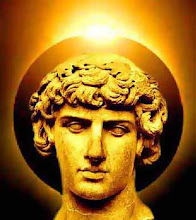Thursday, August 13, 2009
It could have been that early on the morning of Aug. 15, 1969, dressed in jeans and a T-shirt and carrying only a fringed suede purse with a few extra T-shirts, some underwear and about $50 in cash, I hopped into a VW bus driven by a guy I hardly knew -- a friend of a friend -- and headed north to Upstate New York. His loosely issued invitation had come only a few days before: He had extra tickets to a three-day rock concert.
But instead, on the morning of Aug. 15, 1969, I had been employed for exactly 10 days in my first job since college graduation that May, an editing job in downtown Washington that I desperately wanted for professional reasons (I feared I would otherwise be consigned to a typing pool) and financial ones (I was moving into a group house in September and needed the first month's rent).
As that VW bus rolled north, I was sitting in a cubicle, part wall and part frosted glass, at a desk with a high-intensity light, a stack of typewritten manuscripts and four colored pencils: black for editing, blue to mark the text to be typeset in 8-point type, red for 10-point type and green for 12-point type (headlines!). I was wearing a skirt, blouse, stockings and shoes -- women couldn't wear pants to that office. I might as well have been bound with rope.
All of the newfound freedom of having graduated from college, of being able to choose my path, to live independently, now seemed a sham. I had driven myself smack dab into a brick wall of obligation and responsibility. Instead of the shackles of required courses, term papers and exams, I was chained to a new world with an even greater burden of responsibility. No one was helping me with tuition, room and board. I had no vacation, no sick leave. Missing a day of work was not like cutting a class. If I fled to Woodstock, I could get fired.
My generation seemed on two tracks: those who needed a job more than freedom, and those who didn't. I was barreling down the first road, wishing I was on the second.
All day my head was sailing along the highway in that VW bus (with eight-track tapes) as my body trudged over to the carryout for some limp sandwich that I ate at my desk. The L4 ride home up Connecticut Avenue was a bitter reminder that I was definitely on the wrong bus.
Would I have been ready for Woodstock, for a long weekend of camping, chaos, wet sleeping bags, partying, sex, drugs, and rock and roll? Probably not. I had come of age but had missed the first wave of the youth revolution, a fact that seemed very regrettable then -- but not now, since I have since come to understand how much fuel is required to survive over the long term.
Was Woodstock a haven for the overindulged, self-important youth of 1969? Some of my friends think so. But I think that, to its credit, pieces of Woodstock's own crazy world broke off and spun their way into a larger world, especially the one in which I dutifully participated; for about 10 years after Woodstock, its atmospherics were infectious.
The Who, Joe Cocker, Richie Havens, wet sleeping bags and chaos came into my life in other ways. After Woodstock, we knew we could abandon the car on the way to a concert, then hitch a ride back afterward and find the car still waiting for us. We could show up without tickets to see The Who and somehow find ourselves at the front of the crowd, near the stage. And the car that we had left back in the ditch? How did that happen? Who knows, who cares? When we got back to it, people helped us tow it out, as we knew they would.
In those days after Woodstock, I kept my job, paid my taxes, acted responsibly. Yet I would sometimes leave the house without a plan, a destination or even a map. I'd book a one-way fare and worry later about the return. One night I left my fringed suede purse on a coat hook in a bar. I got home before I realized it was gone. But the house was unlocked, so I didn't need a key; my wallet was almost empty of cash and I had no major credit cards -- no one did. There was no such thing as identity theft. I never even went back for that purse. I had lost nothing.
I don't regret that cubicle-bound choice I made on Aug. 15, 1969. But, 40 years later, sometimes I think I could use a little Woodstock in my life.
Jeanne McManus, a former Post editor, is an occasional contributor to the op-ed page.









